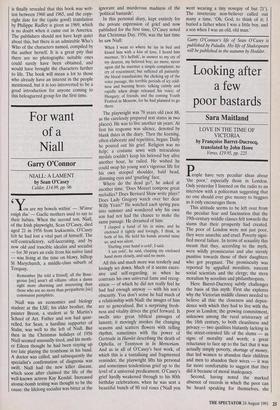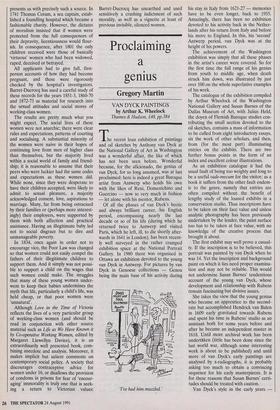Looking after a few poor bastards
Sara Maitland
LOVE IN THE TIME OF VICTORIA by Francoise Barret-Duerocq, translated by John Howe Verso, £19.95, pp. 225 People have very peculiar ideas about `the poor,' especially those in London. Only yesterday I listened on the radio to an interview with a policeman suggesting that no one should ever give money to beggars as it only encourages them.
This attitude seems to be left over from the peculiar fear and fascination that the 19th-century middle classes felt towards the slums that their prosperity had created. The poor of London were not just poor, they were anarchic and cruel. Poverty signi- fied moral failure. In terms of sexuality this meant that they, according to the myth, were wildly promiscuous and also sternly punitive towards those of their daughters who got pregnant. The promiscuity was reported by appalled moralists, nascent social scientists and the clergy; the stem moralism by novelists and philanthropists.
Here Barret-Ducrocq subtly challenges the basis of this myth. First she explores why the Victorian middle classes needed to believe all this: the closeness and depen- dence with which they had to live with the poor in London; the growing commitment, unknown among the rural aristocracy of the 18th century, to both cleanliness and privacy — two qualities blatantly lacking in the street-oriented life of the slums — as signs of morality and worth; a great reluctance to face up to the fact that it was actually simply poverty, shortage of money, that led women to abandon their children and men to abandon their wives — it was far more comfortable to suggest that they did it because of moral inadequacy.
Second, having noted the marked absence of records in which the poor can be heard speaking for themselves, she presents us with precisely such a source. In 1741 Thomas Comm, a sea captain, estab- lished a foundling hospital which became a fashionable charity. However, the dictates of moralism insisted that if women were protected from the full consequences of their depravity, licentiousness would flour- ish. In consequence, after 1801 the only children received were those of basically `virtuous' women who had been widowed, raped, deceived or betrayed.
All applicants had to give full, first- person accounts of how they had become pregnant, and these were rigorously checked by the hospital's investigators. Barret-Ducrocq has used a careful study of these records for the years 1851-3, 1860-70 and 1872-73 as material for research into the sexual attitudes and social mores of working-class women.
The results are pretty much what you might expect. The social lives of these women were not anarchic; there were clear rules and expectations, patterns of courting and socialising. A substantial minority of the women were naive in their hopes of continuing love from men of higher class than themselves, but the majority lived within a social world of family and friend- ship; it is reasonable to assume that their peers who were luckier had the same codes and expectations as these women did. While none, since they were desperate to have their children accepted, were likely to admit to sexual pleasure, a majority acknowledged consent, love, aspirations to marriage. Many, far from being ostracised by their families or (perhaps more interest- ingly) their employers, were supported by them with both affection and practical assistance. Having an illegitimate baby led not to social disgrace but to dire and unmanageable poverty.
In 1834, once again in order not to encourage vice, the Poor Law was changed so that women could not easily compel the fathers of their illegitimate children to support them. And it simply was not possi- ble to support a child on the wages that such women could make. The struggles that many of these young women under- went to keep their babies undermines the myth that life, particularly a child's life, was held cheap, or that poor women were `unnatural'.
Although Love in the Time of Victoria reflects the lives of a very particular group of working-class women (and should be read in conjunction with other source material such as Life as We Have Known it by Co-operative Working Women, edited by Margaret Llewellyn Davies), it is an extraordinarily well presented book, com- bining anecdote and analysis. Moreover, it makes implicit but salient comments on contemporary social policy. A society that discourages contraceptive advice for women under 16, or disallows the provision of condoms in prisons for fear of 'encour- aging' immorality is truly one that is seek- ing a return to Victorian values:
Barret-Ducrocq has unearthed and used sensitively a crushing indictment of such morality, as well as a vignette at least of previous invisible, silenced women.



















































 Previous page
Previous page